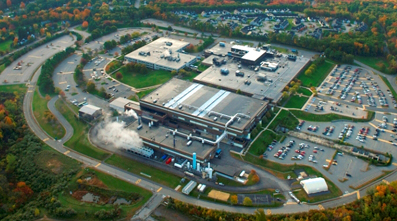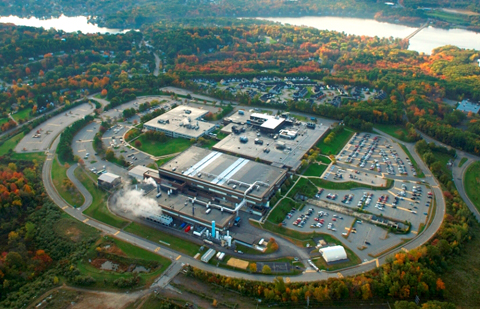

Courtesy
By Nancy Arsenault
Late last week, word reached the public that international semi-conductor giant Intel will be shutting down their chip manufacturing facility in Hudson. The shut down will slash 700 positions by the end of 2014. The first round of layoffs, affecting 100 people, is expected to take place over the next few months. When the entire layoff concludes, the Hudson workforce will have been cut nearly in half.
“Intel has informed its employees that it plans to cease manufacturing operations at its wafer fabrication facility in Hudson, MA,” confirmed Ann Hurd, Manager of Corporate Affairs Intel East Coast, speaking to The Stow Independent on Friday. She said Intel is developing plans to offer other manufacturing positions within the company to laid off employees, but none of those positions are in Massachusetts. “Our other factories are in Arizona and Oregon,” said Hurd of the relocation options.
Hurd also confirmed that Intel has a “high concentration of Stow folks at this site”, with some of those working in manufacturing, but could not give an exact number of Stow-based employees who might be affected by the shut down decision. She acknowledged that such a vast layoff will have an impact on Stow and surrounding towns, as Intel employees have settled into communities all around the Hudson area. She said some may choose to relocate to the western states to continue with Intel, while others may accept the severance package and remain in the area to seek new employment.
The Research & Development portion of the Intel Hudson facility, Intel’s Microprocessor Development Center, will continue to operate in Hudson and be unaffected by the layoff. “The company’s microprocessor design teams of 825 people based in Massachusetts are not impacted by this decision,” confirmed Hurd. Intel currently employs about 1600 people, down from a high of 2191 in 2006.
The Hudson Intel campus is comprised of three buildings totaling 1.3 million square feet on 149 acres of a former apple orchard. The buildings originally housed Digital Equipment Corp, with the chip factory having been built by Digital in 1994, before selling the entire campus to Intel in 1998. One building, of about 90,000 sq. ft., is completely dedicated to manufacturing the 200mm microchip, or 8” wafer, explained Hurd. A second building is dedicated to warehousing and shipping, with a third housing the local research & development arm of the company.
Hurd said the decision is based on current and future direction of chip technology. The 200mm chip size is not in great demand and its manufacturing technology is outdated, she said. While most Intel manufacturing facilities are designed to produce the company’s full range of chip sizes, this was the last facility dedicated solely to the 200mm chip.
Today, most chip production is concentrated on the very small chips like those for cell phones and other newer devices, and the 200mm chip is considered to be of a large size. She said there are still companies manufacturing and selling the 200mm and 300mm chip for particular products, and those companies may have an interest in the Intel facility.
“The objective is to put it up for sale, preferably as an operating factory. We know that this will be a challenge, given the unique nature of the facility, but we will be working with our Corporate Real Estate department to evaluate options.”
Hurd said the factory has been completely refitted, including utilities and systems, as well as equipment, all to house a self-contained chip manufacturing operation. “I think of the building as a working machine, with people in it,” she said.
“Our overall goal is to ensure that we maximize Intel’s investment,” explained Hurd; an investment that peaked at $6 billion as a cumulative total over the years for the manufacturing facility, including modernization efforts in 2006. That investment and upgrade brought $300 million in Massachusetts tax incentive credits to the company. Intel’s investment in the Hudson facility and the resulting production there, resulted in an average of $1 million in annual taxes paid to the Town of Hudson, an amount confirmed by the Hudson Assessor’s office. As part of a state program, the town also issued property tax breaks to Intel for several years, amounting to tens of thousands of dollars.
While layoffs and the closing of the manufacturing plant are an unavoidable step in the evolution of this local employer, Hurd said that Intel will remain committed to Hudson and the greater community. She said that corporate grants from the company’s many foundations will continue to aid the region. Most recently, Stow was the recipient of a $400,000 grant from Intel and OAR toward construction of an environmentally- friendly storm water management system at the new Center School. “We will still be awarding grants, and we are very involved with STEM [Science, Technology, Engineering, and Mathematics] education in the schools and are growing that program,” said Hurd. “We absolutely will continue these local efforts.”